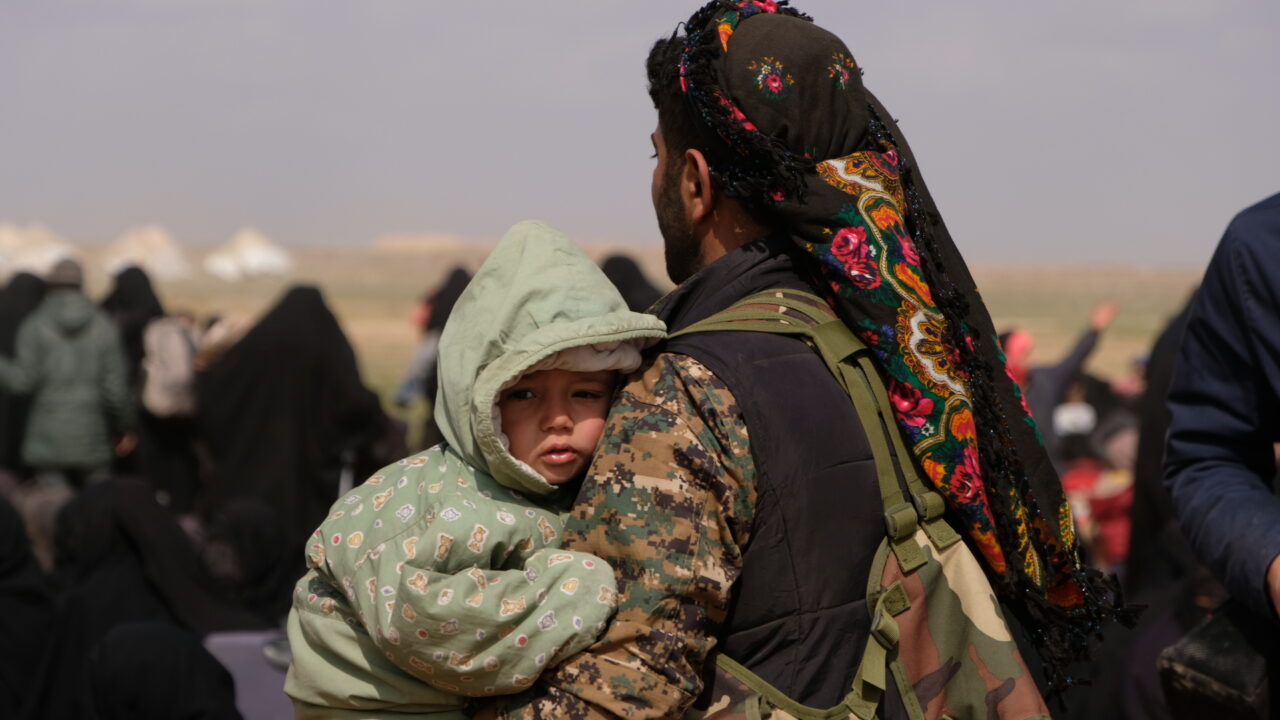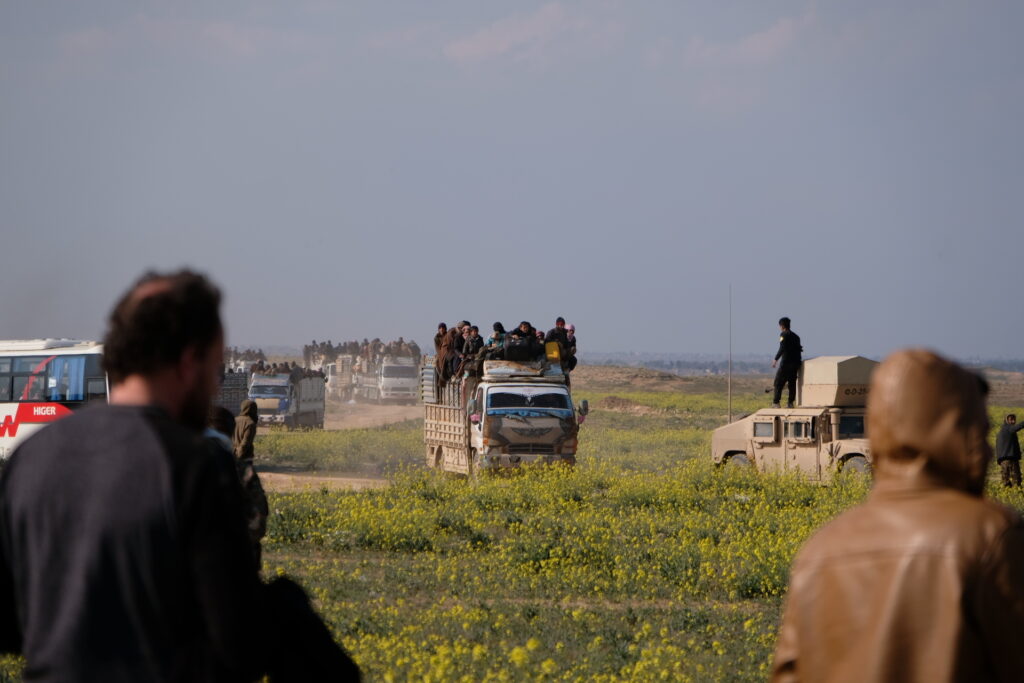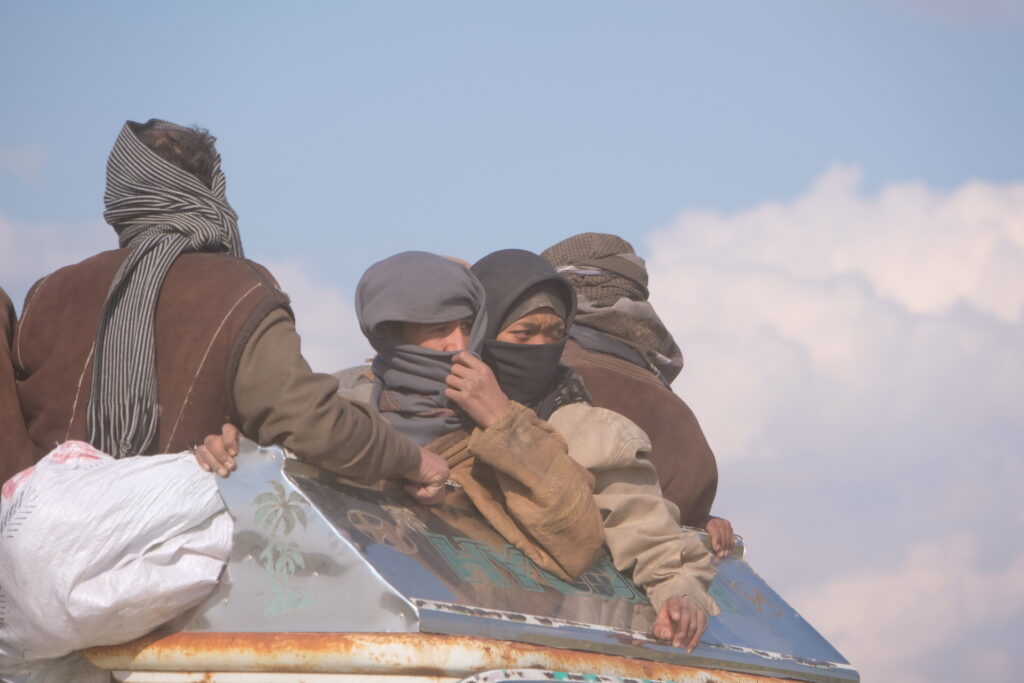The ISIS Prison Camps the World Forgot
After defeating ISIS in Syria, the Kurds continue to house tens of thousands of captured militants. Why isn’t the world helping to guard and rehabilitate them? A member of the multi-ethnic Syrian Democratic Forces assists a child born to ISIS members. (Photo: Rojava Information Center.)
A member of the multi-ethnic Syrian Democratic Forces assists a child born to ISIS members. (Photo: Rojava Information Center.)
The Syrian Kurdish region known as Rojava is famed for its leading role in the military defeat of ISIS. The conflict presented the starkest contrast imaginable: A genocidal, patriarchal, authoritarian Islamic State versus a secular, Kurdish-led army spearheaded by all-female units. Fighting alongside a coalition of Arab, Christian and Yazidi allies, the Syrian Kurds drove ISIS from their hometowns and implemented a new system of direct-democratic, grassroots, women-led governance. When ISIS’ black standard was torn down in Raqqa and replaced with the Kurds’ vibrant colours in 2019, the world looked on and cheered.
But four years on from ISIS’ formal defeat, Rojava has a problem. The region’s Kurdish-Arabic military alliance now guards 2,000 imprisoned foreign ISIS fighters along with 8,000 Syrian and Iraqi combatants, most held in substandard, ad-hoc detention facilities in repurposed schools. Meanwhile, displacement camps in the windswept Syrian desert hold tens of thousands of ISIS-linked women and children, sometimes alongside the very civilians ISIS terrorized.
Ironically, the largest female-only space in the Kurdish-led region (or perhaps even the world) lies not in one of its famous communes or all-female cooperatives, but Hol Camp, a vast, U.N.-recognised facility holding just under 50,000 people in a “mini-caliphate.” Walking through Hol, you’re regularly confronted by children chanting ISIS slogans and hurling rocks at ambulances. Members of the Kurdish-Arab military alliance patrol endless rows of tents, while their civilian administration provides food and basic medical care. All the while, radical ISIS affiliates groom their sons to take up the mantle of jihad; some even keep members of the Yazidi religious minority as slaves, secreted among the endless rows of tents.
In visits to these camps and facilities, I’ve met with Kurds and Arabs determined to work together and break the cycle of violence.
With many of the world’s most radicalized jihadi militants living cheek-by-jowl in cramped facilities operated by a cash-strapped administration in an active war-zone, the situation is often described as a “ticking time-bomb.” But in reality, the explosions never stopped. In 2022, a massive ISIS prison uprising claimed hundreds of lives, while ongoing Turkish bombing campaigns against the region have allowed hundreds of ISIS affiliates to flee. In Hol, female ISIS loyalists regularly assassinate guards, humanitarian staff and fellow inmates, while raising a new generation of potential ISIS members.
The region, once known for its restorative, community-based justice system and the lowest incarceration rate than any country in the world (bar San Marino) now ranks among the world’s highest rates, due to the burden of ISIS detainees and their families. For four years, the Kurdish-led, civilian Autonomous Administration has been valiantly battling to find progressive solutions to this crisis: rehabilitation centers for radicalized minors, women-led outreach programs in camps and ISIS’ former heartlands and amnesties for low-level ISIS members. In visits to these camps and facilities, I’ve met with Kurds and Arabs determined to work together and break the cycle of violence.
For now, however, these bold programs remain insufficient to the daunting task of rehabilitating thousands of the world’s most committed Islamist extremists, hellbent on revenging themselves first on their Kurdish vanquishers — and then the rest of us. Can the Syrian Kurds trade on their dwindling international support to find a genuinely transformative solution? Or will a familiar pattern of detention-bred resentment allow ISIS to reemerge and brutalize local minorities and women once again?

Local Kurdish officials do not mince words. This crisis is too big for the impoverished and isolated administration of a region that remains internationally unrecognized, subject to a punishing trade and travel embargo, and pounded by regular Turkish airstrikes. (In the most recent attacks, Turkish planes targeted 175 sites, taking out energy, water and humanitarian infrastructure.) “ISIS is organizing, and getting stronger day by day,” says Bedran Chiya Kurd, head of the Administration’s foreign aAffairs department, about an insurgency that has killed more than 80 people this year alone. “This is a very heavy burden, beyond our capabilities. We urgently need support.”
Instead, support is dwindling. Starting in 2014, the multi-ethnic military force led by the Syrian Kurds received aid from the U.S.-led International Coalition to Defeat ISIS, and forged a highly successful partnership. But it was always temporary, transactional and focused on military objectives. The driving goal was merely to bomb ISIS to smithereens. I was in the room on the frontline when U.S. Special Forces encouraged Syrian Kurdish commanders to call in close-contact airstrikes, pushing the envelope on their formal rules of engagement by destroying empty properties with no obvious ISIS presence. This approach ensured ISIS’ defeat was only a matter of time.
But I was also there as tens of thousands of surrendering ISIS fighters and family members streamed out of their final desert stronghold in Raqqa. Almost all chose to surrender to the Syrian Kurds, knowing they would receive far more humane treatment here than at the hands of the official Syrian government under Bashar al-Assad, or across the border in neighboring Iraq. I heard this sentiment repeated by multiple ISIS prisoners during interviews on the ground. Other men and women approached waving white flags but were strapped-up with suicide bombs. Taken altogether, the surrendering fighters presented a yet more serious threat that Washington was unprepared for, and ultimately uninterested in handling.
The cash-strapped administration has been left to both rebuild impoverished, primarily-Arab regions flattened by U.S. airstrikes, and at the same time shoulder the burden of detaining thousands of radicalized international militants from over 40 countries.
Among Western powers, the U.S. stands alone in having repatriated the majority of its own ISIS members, but it’s clear U.S. appeals to other countries to follow suit have fallen on deaf ears.
“We’ve been caring for these criminals for five years, keeping them in prison without trial, which doesn’t comply with international standards,” laments Chiya Kurd. “This is a problem for the whole world.”
The whole world, however, has turned its back. In a statistical analysis, I found only 4% of foreign ISIS fighters have been returned home, with repatriations dwindling to almost none in recent years, while less than 20% of over 12,000 foreign women and children have been accepted back by their home countries. Among Western powers, the U.S. stands alone in having repatriated the majority of its own ISIS members, but it’s clear U.S. appeals to other countries to follow suit have fallen on deaf ears.
The administration is regularly lambasted by international commentators for the admittedly substandard conditions of camps and detention facilities in towns such as Qamishlo, Derik and Shedadi. Of particular concern is the massive Hol Camp and the “Panoroma” detention facility for male ISIS members in Heseke. It was lightly fortified with limited Western financial support following a deadly 2022 uprising that saw ISIS overrun a repurposed school building and behead civilian captives.
Often glossed over are the Administration’s repeated demands that nations repatriate their own nationals, and for the creation of an international justice mechanism to try ISIS members under the aegis of the Coalition, International Criminal Court, or another competent body. At the very least, the administration has said, it deserves financial and legal support to try international ISIS members in its own (internationally unrecognized) legal system. Needless to say, this would still not solve the question of where to send those judged innocent or who have completed their prison terms.
“[ISIS-linked] detainees must have meaningful, prompt access to due process,” says Letta Tayler of Human Rights Watch. “Most of these detainees’ countries of origin, as well as the Coalition, have been largely content to ignore the illegality of this massive detention crisis and its global ramifications.”
This summer, the Administration announced plans to begin what Chiya Kurd describes as “public and open trials, which will try to meet international standards — international monitors, observers, experts and lawyers will all be welcome.”
But as with previous proposals, no date has been set, and neither the Coalition nor any international government has come forward to support the proposal. This reticence is bitterly disappointing to Syrian Kurds who saw themselves as defeating ISIS on behalf of the world, but it is not unsurprising. “This is a complex war zone,” notes Tayler. “Trials could be risky for judges, prosecutors, defense lawyers and the detainees themselves. And the administration is not a state, which could potentially complicate legal challenges to convictions.”
The most serious obstacles to completing the ISIS trials are political, not legal. The same U.N. Security Council decree that justifies the ongoing U.S. presence in the region also provides for bringing ISIS to justice; it would be a simple matter for the U.S. to act unilaterally in backing the Administration’s proposal. But repatriating foreign ISIS members would be domestic political suicide in many Western countries. Further disincentivizing Western support is Turkey’s bitter opposition to any accomplishment by, or aid sent to, the progressive Kurdish-led experiment in stateless autonomy. And so the international community has simply turned its back.

Thousands of local ISIS fighters have already been tried by local courts in the region formally known as North and East Syria (NES). The name was changed from the more familiar Kurdish word “Rojava” in a gesture to the fact its population is now majority-Arab and marked by multi-ethnic federation and cooperation. While imperfect (there are no pro bono defence lawyers), the NES legal system comes far closer to international standards than the Syrian regime’s brutal, opaque detention system, or that in neighbouring Iraq, where ISIS members are sentenced to death in kangaroo courts. In NES, the death penalty has been outlawed, and around 10% of those put on trial are found innocent, a sign that some due process is followed. Indeed, these courts provide a potential blueprint for trying the hardened foreign militants in an adapted, internationally supported framework in NES.
Regular amnesty programs, meanwhile, have allowed thousands of low-ranking ISIS members to return home after completing shortened sentences, and provided a pathway for over 13,500 Syrian detainees in Hol Camp to return home on the basis of guarantees provided by local tribal leaders. (Iraqi detainees are also being systematically returned home.) These programs are partly pragmatic responses to prison overcrowding, but sleeper-cell attacks are steadily decreasing in these communities, suggesting the forgive-and-forget approach is broadly working out.
Many amnesties have been granted in response to repeated demands from conservative rural Arab communities where ISIS once garnered support. The progressive Kurdish-led administration must now find ways to work with communities like these that still harbour sympathy for ISIS’ radical interpretation of Islam.
The managed release of ISIS-linked detainees as demanded by Arab community representatives is one way of building trust in the restive, impoverished tribal regions that served as the staging-ground for ISIS’ rise. At one such consultation on the subject, I spoke with Sheikh Muhammed Abdullah of the powerful Egidat tribal confederation. “We have attended many such meetings before, and were often dissatisfied by the results,” he told me. “But today we saw significant changes. This strong and genuine incorporation of Arab representatives in the discussions marks a major step for [the Administration].”
U.N. aid to Syria was slashed in half this summer as global humanitarian interest turns elsewhere, while U.S. funding focuses on the military and strengthening ISIS detention facilities, not on constructive support with social dimensions.
The Administration wants to go further. It is vocally promoting what it calls a “brotherhood of peoples” — uniting Kurds, Arabs and the Yazidi and Christian minorities — and a “Democratic Islam” in opposition to ISIS’ strict Salafist interpretation of the religion. A religious academy aims to train Islamic teachers to disseminate these ideas among conservative populations, while the region’s dynamic autonomous women’s movement has programs in camps and detention centers to provide psychological support, vocational training and room for discussion. Two such facilities for boys raised under ISIS’ spell in a highly radicalized environment are attempting to rehabilitate hundreds of children aged 11 to 18. At both the Houri and Orkesh centers, values of tolerance and cooperation are delivered alongside practical education and training.
“We’re trying to create an atmosphere whereby residents don’t feel like they are locked up in a prison with guards watching their every move,” says Sara Efrin, who heads the Houri center. “There is definitely improvement, but it takes time and patience. When I first started working here, some of the boys refused to look at me. Now, if I’m absent for a day, they ask after me.”
These centers have been criticized for separating boys from their mothers, with whom they are allowed limited contact. But given the epidemic of jihadist violence in Hol Camp, it’s hard to imagine a more effective alternative. Half of Hol’s population are aged under 12, and urgent action is needed to prevent a new generation of ISIS militants from growing up in the Syrian desert. Condemnations of the conditions in Hol Camp do nothing to help the Administration, which has repeatedly appealed for international support. Indeed, humanitarian conditions in Hol are scarcely worse than those for ordinary civilians in the region, and the camp is internationally recognized, unlike those camps where civilians displaced by Turkish invasions suffer without access to U.N. aid or support.
These pilot programs don’t need criticism from the side-lines; they need to be expanded and bolstered with reconstruction aid to the impoverished Arab regions where Hol Camp releasees are attempting to rebuild their lives. Though limited and insufficient, they point the way toward a more productive solution.
At the moment, the situation is deteriorating. U.N. aid to Syria was slashed in half this summer as global humanitarian interest turns elsewhere, while U.S. funding focuses on the military and strengthening ISIS detention facilities, not on constructive support with social dimensions. The only U.N. aid crossing into NES, meanwhile, has been shuttered due to Russian pressure. While some humanitarian funding is available for Syria, the response to a deadly earthquake that killed thousands of Syrians in 2023 highlighted the dangers of aid being routed to the corrupt Assad regime and areas held by Turkish-backed jihadists, rather than to the progressive, Kurdish-led administration. Most seriously of all, the latest wave of Turkish bombings against the region has left 600,000 without access to water, over a million people and 30 health facilities without access to power, and the entire region without domestic cooking gas. The Houri and Orkesh rehabilitation programs were forced to suspend their operations in response to this savage bombing campaign.
Turkish drone strikes targeting Syrian Kurdish commanders leading the ongoing anti-ISIS mission have killed 76 people this year alone, including civilian administrators. Just this week, a senior commander who worked directly with the U.S. to combat ISIS was killed in his home along with his young child. As Turkey paves the way for an ISIS resurgence — sometimes coming close to killing U.S. personnel — Washington stands by and says nothing.
Ensuring ISIS’ enduring defeat means more than just reducing Raqqa to rubble. It means backing the Autonomous Administration in its efforts to rebuild ISIS’ former capital and other regions ravaged by their radical insurgency. It means preventing Turkey from decimating the Kurdish-Arab alliance that stands as the West’s main bulwark against ISIS. And it means offering serious support to both the Administration’s call for legal mechanisms and rehabilitation, consensus-building and outreach programs. The Kurdish-led Administration was the West’s most important military partner in the fight against ISIS, and it should be trusted to lead the more profound struggle to break the cycle of violence altogether.
“Our region is the global center of the fight against terrorism,” says Chiya Kurd. “And trying and exposing ISIS’ crimes against humanity is an important part of this struggle. We paid a very heavy price in the fight against ISIS. But our calls for international support have always gone unanswered.”
Your support matters…Independent journalism is under threat and overshadowed by heavily funded mainstream media.
You can help level the playing field. Become a member.
Your tax-deductible contribution keeps us digging beneath the headlines to give you thought-provoking, investigative reporting and analysis that unearths what's really happening- without compromise.
Give today to support our courageous, independent journalists.






You need to be a supporter to comment.
There are currently no responses to this article.
Be the first to respond.